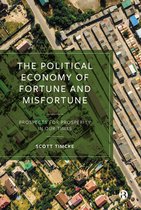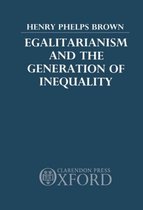Inequality and Democratic Egalitarianism Marx's Economy and Beyond' and Other Essays 'Marx's Economy and Beyond' and Other Essays
Afbeeldingen
Sla de afbeeldingen overArtikel vergelijken
- Engels
- Paperback
- 9781526143686
- 07 oktober 2019
- 192 pagina's
Norman Geras
Samenvatting
This book arose out of a friendship between a political philosopher and an economic sociologist, and their recognition of an urgent political need to address the extreme inequalities of wealth and power in contemporary societies.
The book provides a new analysis of what generates inequalities in rights to income, property and public goods. It claims to move beyond Marx, both in its analysis of inequality and exploitation, and in its concept of just distribution. In order to do so, it critiques Marx’s foundational Labour Theory of Value and its closed-circuit conception of the economy. It points to the major historical transformations that create educational and knowledge inequalities, inequalities in rights to public goods that combine with those of rights to private wealth. In two historical chapters, it argues that industrial capitalism introduced new forms of coerced labour in the metropolis alongside a huge expansion of slavery and indentured labour in the New World, with forms of bonded labour lasting well into the twentieth century. Only political struggles, rather than any economic logic of capitalism, achieved less punitive forms of employment. It is argued that these were only steps along a long road to challenge asymmetries of economic power and to realise just distribution of the wealth created in society.
The book is addressed to a wide audience of fellow citizens, as well as to students of political philosophy, economic sociology, and political economy.
This book arose out of a friendship between a political philosopher and an economic sociologist, and their recognition of an urgent political need to address the extreme inequalities of wealth and power in contemporary societies.
It provides a new analysis of what generates inequalities in rights to income, property and public goods in contemporary societies. By critiquing Marx’s foundational theory of exploitation, it moves beyond Marx, both in its analysis of inequality, and in its concept of just distribution. It points to the major historical transformations that create educational and knowledge inequalities, inequalities in rights to public goods that combine with those to private wealth. It argues that asymmetries of economic power are inherently gendered and racialized, and that forms of coercion and slavery are deeply embedded in the histories of capitalism.
This book is relevant to United Nations Sustainable Development Goal 10, Reduced inequalities
Productspecificaties
Inhoud
- Taal
- en
- Bindwijze
- Paperback
- Oorspronkelijke releasedatum
- 07 oktober 2019
- Aantal pagina's
- 192
- Illustraties
- Nee
Betrokkenen
- Hoofdauteur
- Mark Harvey
- Tweede Auteur
- Norman Geras
- Hoofduitgeverij
- Manchester University Press
Overige kenmerken
- Extra groot lettertype
- Nee
- Product breedte
- 138 mm
- Product hoogte
- 10 mm
- Product lengte
- 216 mm
- Studieboek
- Nee
- Verpakking breedte
- 138 mm
- Verpakking hoogte
- 10 mm
- Verpakking lengte
- 216 mm
- Verpakkingsgewicht
- 227 g
EAN
- EAN
- 9781526143686
Je vindt dit artikel in
- Categorieën
- Taal
- Engels
- Boek, ebook of luisterboek?
- Boek
- Beschikbaarheid
- Leverbaar
- Studieboek of algemeen
- Algemene boeken
Kies gewenste uitvoering
Prijsinformatie en bestellen
De prijs van dit product is 29 euro en 57 cent.- Prijs inclusief verzendkosten, verstuurd door bol
- Ophalen bij een bol afhaalpunt mogelijk
- 30 dagen bedenktijd en gratis retourneren
- Dag en nacht klantenservice
Rapporteer dit artikel
Je wilt melding doen van illegale inhoud over dit artikel:
- Ik wil melding doen als klant
- Ik wil melding doen als autoriteit of trusted flagger
- Ik wil melding doen als partner
- Ik wil melding doen als merkhouder
Geen klant, autoriteit, trusted flagger, merkhouder of partner? Gebruik dan onderstaande link om melding te doen.








